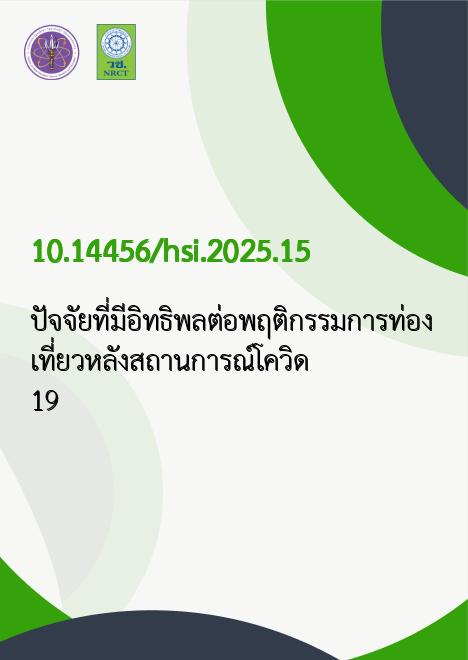
|
ปัจจัยที่มีอิทธิพลต่อพฤติกรรมการท่องเที่ยวหลังสถานการณ์โควิด 19 |
|---|---|
| รหัสดีโอไอ | |
| Creator | สวลี อุตรา |
| Title | ปัจจัยที่มีอิทธิพลต่อพฤติกรรมการท่องเที่ยวหลังสถานการณ์โควิด 19 |
| Contributor | รัชฎา แต่งภูเขียว, ณัฐนันท์ นิติสิริ |
| Publisher | สถาบันวิจัยและพัฒนา มหาวิทยาลัยกาฬสินธุ์ |
| Publication Year | 2568 |
| Journal Title | วารสารมนุษยศาสตร์ สังคมศาสตร์ และนวัตกรรม มหาวิทยาลัยกาฬสินธุ์ |
| Journal Vol. | 4 |
| Journal No. | 1 |
| Page no. | 210-226 |
| Keyword | พฤติกรรมการท่องเที่ยว, โควิด 19, สมการโครงสร้าง |
| URL Website | https://so02.tci-thaijo.org/index.php/hsi_01/article/view/278474 |
| Website title | วารสารมนุษยศาสตร์ สังคมศาสตร์ และนวัตกรรม มหาวิทยาลัยกาฬสินธุ์ |
| ISSN | ISSN 2821-9635 (Online) |
| Abstract | Currently, COVID-19 has been declared an endemic disease. Most of the population has been vaccinated and public health has improved, leading to the relaxation of lifestyle-related restrictions by various agencies. Nevertheless, safety and hygiene remain critical concerns, particularly among individuals with underlying health conditions. As the pandemic has subsided, sectors across the economy, especially the tourism industry are striving to recover. This study aimed to analyze the factors influencing tourism behavior after the COVID-19 pandemic and to test the goodness of fit between the proposed structural model and empirical data. The research employed a self-administered questionnaire to collect data from a sample of 514 tourists, consisting of residents from Kalasin Province and visitors from other provinces. Data were analyzed using Structural Equation Modeling (SEM). The findings revealed that the COVID-19 pandemic significantly influenced post-pandemic tourism behavior. Although the initial model did not fit the empirical data according to the proposed hypothesis, after model adjustment to align with the local context of Kalasin Province, it was found that the pandemic had a statistically significant impact at the 0.01 level on Risk Management, Service Delivery, and Hygiene and Safety. The results of this study can be disseminated to the public and tourists to support effective risk management and travel planning emphasizing the importance of clean, hygienic, and safe travel destinations in preventing future disease outbreaks. |